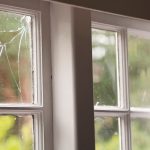Have you noticed window condensation and ice buildup on the inside panes of your windows over the winter? It’s related to the dew point, and this is the temperature at which you will get window condensation due to the level of moisture in the interior air of your home. There are a number of factors which affect the dew point temperature and when you will notice condensation.
Window Condensation and Ice Build-up: Factors that can Cause this Situation
Most windows let a lot of heat escape from the home. Low thermal performance is an issue, even with double-paned windows. With a double-paned window, the outside temperature can be 0 degrees F and it can be 70 degrees inside the home. The interior surface on the glass will continue to drop, resulting in condensation.
Humidity is one factor that is responsible for window condensation and resulting ice build-up. Everyday activities like cooking can increase the humidity levels in your home. The more moisture in the air, the more condensation you will get on the cold surface of your windows.
Older or improperly-installed windows will leak air from the inside of the building. Cold air leaking through the window opening or around the sash will lower the interior surface temperature and make it more likely that you will see condensation and ice inside the window.
Potential Impact of Condensation and Ice on the Window
Not only is condensation and ice buildup on your window going to mean higher energy bills and create cold spots in your home, it can also lead to other problems. Moisture in the wood can lead to warped frames. In some cases, the glass may even crack.
Moisture creates the perfect environment for mold to grow. If it becomes airborne, it can lead to a number of lung and sinus issues.
The Solution Dealing with Condensation and Ice Issue
If you have noticed condensation and ice buildup on the inside of your windows over the winter, the solution to the problem is to upgrade your windows to ENERGY STAR certified products. Replacing your windows with a more energy-efficient product will lower the risk of developing this type of problem and keep your energy costs down too.





